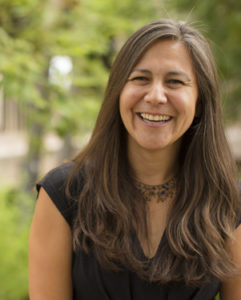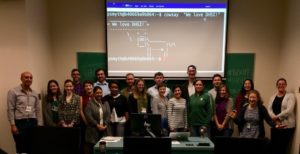 Jennifer Nichols (@jennytnichols) is the Digital Scholarship Librarian and interim Department Head for the Office of Digital Innovation and Stewardship at the University of Arizona Libraries, and Co-Director for the iSpace, the libraries’ innovation and maker space. She attended the Digital Humanities Summer Institute and the DLFxDHSI unconference in Victoria, BC with support from a Cross-Pollinator Tuition Award. Learn more about Jennifer, or read on for her reflection on her experience.
Jennifer Nichols (@jennytnichols) is the Digital Scholarship Librarian and interim Department Head for the Office of Digital Innovation and Stewardship at the University of Arizona Libraries, and Co-Director for the iSpace, the libraries’ innovation and maker space. She attended the Digital Humanities Summer Institute and the DLFxDHSI unconference in Victoria, BC with support from a Cross-Pollinator Tuition Award. Learn more about Jennifer, or read on for her reflection on her experience.
Thank you to DLF for the generous support to attend DHSI and the first ever DLFxDHSI unconference.
It goes without saying that 10 days in the Pacific Northwest, in the beautiful city of Victoria, is a gift that anyone could appreciate. Verdant green landscapes accented with bold floral displays are a sensory delight, and do wonders to restore my sense of connection to this earth, and to my work here upon it. Now, coming into this inviting environment from the Sonoran desert in early June is like transporting unto another planet. I joked that I would be the only one sporting a down coat. Though I hesitated, I’m glad I brought it for those two chilly, rainy days.
As an academic librarian, I often struggle to maintain my identity as a scholar. I am consumed with the entirety of my role–building partnerships, running programs, consulting with students and faculty, managing staff. Though scholarship is a part of my job, it is a small part (5-10% in fact, depending on the year). I know I’m not alone in that, and one of the most meaningful experiences for me at DHSI was the opportunity to connect with others in similar roles as my own.

I participated in week one of DHSI and attended the Web APIs and Python class taught by CUNY Grad Center librarian Stephen Zweibel and grad students Jojo Karlin, Patrick Smyth, and Jonathan Reeve (of Columbia University). I chose this class because I wanted to learn a new, tangible skill, and Python is one of those things that I have struggled to apply, and thus never made any progress. I wanted to come away having built something, so naturally, I used my time and the expertise of my instructors, to create a database of superhero stats to examine the sexism (duh) inherent in the design of their skills and talents. Stay tuned for part two, the Twitter bot that faces off male and female superheroes…
So many dynamic and relevant conversations were happening at the Institute, and when I listened to the courses (and unconferences and brown bags) described in lively and inviting ways during the welcome session, I was impressed. As anyone who has attended DHSI will tell you, you cannot possibly do it all, and though you may be tempted, it is not recommended. Take comfort that these conversations are happening, and know that there are many ways to jump in. The Race and DH course was one such conversation that encouraged me. As the conversation spilled out into the whole group, and flowed into each classroom and over Twitter, I was relieved. These are essential to our DH pedagogy work and should not be confined to one course.

In my time at DHSI, I also wanted to connect with others, and my final day at the DLFxDHSI unconference on Social Justice and Digital Libraries was the perfect way to end my experience. After a week of learning Python with mostly grad students and scholars, I was so happy to be reunited with my library tribe! I reflected and applied learning from the week with like-minded professionals, met new people who shared my work, who wanted to think about alternative ways of doing and being together. The conversations we cultivated were enlightening and pertinent. We asked questions like How can we advance social justice on faculty projects that are “not yours”? Is there a difference between Environmental Justice and Climate Justice? In what ways are we still not valuing indigenous discourse? We considered ways to dismantle racists, sexist, and ableist constructions and how to interrogate the power that archivists hold.
What else can I say? The week was dynamic and full, and I am so grateful to have spent this time as a student, a learner and a colleague. Thanks DLF, for bringing me here, and for bringing the two communities together. Without you, I may never have seen myself as belonging here.
